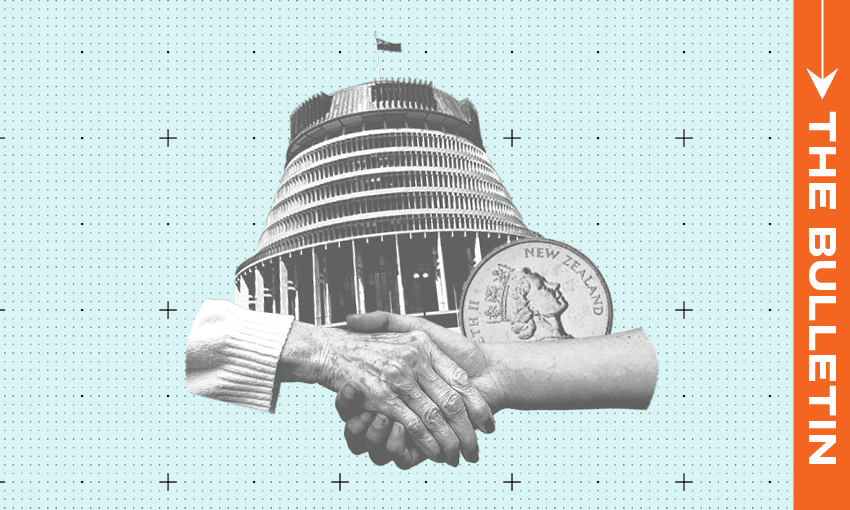The government has wiped 33 current pay equity claims and tightened future access – and they did it in lightning-quick time, writes Catherine McGregor in today’s extract from The Bulletin.
To receive The Bulletin in full each weekday, sign up here.
Sweeping pay equity change rushed through parliament
With virtually no warning, the government has pushed through sweeping changes to New Zealand’s pay equity regime. As Stuff’s Glenn McConnell explains, gender-based pay equity claims will still be permitted, but the bar has been raised significantly: affected occupations must now be at least 70% female-dominated for the past decade, with “an added focus on whether employers would be able to afford a higher wage bill” and stricter rules on job comparisons. All 33 active claims – covering sectors like health, education, and local government – have been extinguished.
MPs were yesterday called to debate the legislation through its first and second reading, bypassing select committee scrutiny or public consultation. “MPs were only shown the documents for the bill on the afternoon they were asked to debate it,” notes McConnell. In a scathing (paywalled) column, the Herald’s Thomas Coughlan writes that “bad lawmaking” has reversed more than a decade of pay equity gains. “It is deeply wrong that Parliament can take away that work in a matter of hours.”
The PM has denied this month’s budget was the reason for the urgency, but conceded it could save the government “billions”. Pay equity claims have been concentrated in the public sector, with costs to the Crown of all settlements so far totalling $1.78 billion a year, RNZ’s Jo Moir reports.
Thousands of workers back to square one
Public service unions and Labour MPs decried the abrupt cancellation of the 33 live claims, many of which were well advanced and represented more than 150,000 workers. “This is a dark day for New Zealand women,” said Public Service Association national secretary Fleur Fitzsimons. “It throws away all the work that has been done to date solely to save the government money.” The teachers pay equity claim alone covered more than 90,000 workers in the education sector, while tens of thousands of care and support workers and health administrators were also in line for long-awaited pay corrections.
Labour leader Chris Hipkins accused the government of “sacrificing equal pay for women in order to balance the budget” while Greens co-leader Marama Davidson labelled it “a politically violent act” towards women workers.
Librarians singled out
During her announcement, van Velden defended the changes by referencing librarians, saying some had “compared themselves to engineers” in their pay equity claims. Speaking to The Spinoff, PSA delegate and library worker Tessa Bowler called that a deliberate mischaracterisation. “It’s not true we’re comparing ourselves to engineers. That is part of the pay equity process: we take a job that is male-dominated like an engineer, and a job that is female-dominated like a library assistant, and we compare the effort it takes to do the job well.” The new legislation will now require such comparisons to be drawn from male roles within the same or similar organisations, narrowing the scope significantly.
Bowler added: “We were really far along in our pay equity claim – we’ve done assessments, interviews, data analysis – and then Brooke gets to say this isn’t happening any more. I don’t understand why they want to attack everyday, hardworking women who are providing for their communities.”
A hard-won regime dismantled
The existing pay equity system was built on the landmark case brought by Lower Hutt caregiver Kristine Bartlett, who successfully argued that her $14.32 hourly wage reflected systemic gender-based undervaluation. Her legal fight led to a $2 billion settlement for 55,000 aged-care workers in 2017 and ultimately prompted amendments to the Equal Pay Act in 2020. Since then, more than 100,000 workers have seen their pay corrected under the new regime.
Bartlett told the NZ Herald she was “just about crying” after hearing yesterday’s news. “It’s hurting, it’s really hurting … Women have just been let down so terribly.” While she’s prepared to fight again, she said the decision to ram the bill through without public input was “frightening”. “Nobody is given a chance to stand up and say anything – it’s just done.”
More reading:
- Max Rashbrooke: A stocktake of all the policies rolling back workers’ rights in New Zealand (The Spinoff)
- Jo Moir: How the pay equity changes brought out two very different sides of the coalition. (RNZ)
- Luke Malpass: Pay equity slashing a sub-plot in a much larger game (The Post, paywalled)


